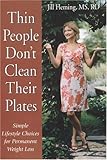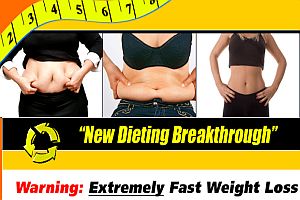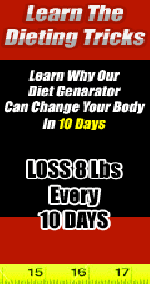Thin People Don’t Clean Their Plates: Simple Lifestyle Choices for Permanent Weight Loss
When Jill Fleming obtained her bachelor of science degree in dietetics and a master’s degree in nutritional sciences, she found herself carrying an extra 40 pounds. Since her plan was to work with overweight people t. . . More >>
Thin People Don’t Clean Their Plates: Simple Lifestyle Choices for Permanent Weight Loss







This book is such a common sense approach to weight loss and maintenance!! It is an easy and enjoyable read. It is the best and healthiest weight loss program ever!! Thanks Jill, for sharing your knowledge with us
Rating: 5 / 5
Super! This dietician has succinctly summarized success skills of thin people and the simple choices they make daily. You’ll never buy another diet book after reading this. Practical, scientific, not a “quack/quick” gimmick. Great reading but even better living.
Rating: 5 / 5
No gimmicks, no magic or overnight release of excess weight. Ms. Fleming simply offers a methodical, commonsense approach to what we consume. As a food addict, my ability to remain fit and trim can be challenging. Though not all of Ms. Fleming’s suggestions work for me, I found this book to be an enjoyable read and motivational to keep the pounds from reappearing.
Rating: 4 / 5
Registered dietitian and motivational specialist Jill Fleming presents Thin People Don’t Clean Their Plates: Simple Lifestyle Choices For Permanent Weight Loss is not a get-thin-quick fix, or a fad diet, but rather a straightforward guideline to making permanent changes in one’s lifestyle and one’s body. Restrictive diets don’t work as a long-term weight-loss solution, because they cause the body to enter a fasting mode that burns fewer calories. What does work long term is balanced nutrition instead of just cutting out foods, a lifelong commitment to exercise – even simple exercises that can be done while driving a car – and a sincere commitment to treating one’s physical body better overall. Highly recommended for anyone striving to make positive improvements in their weight management and overall physical health.
Rating: 5 / 5
For some people who don’t have a strong emotional attachment to food, and this is very likely the minority of heavy people ( you’ve heard them–they’re the ones who lost weight by just cutting back, or who say it’s just not that complicated), this book is probably a real eye-opener. However, I don’t think it’s an authentic look at what thin people who really don’t think about their weight do. I know some naturally thin people and I can tell you they don’t carry snacks, they don’t drink a lot of water, and they don’t eat a lot more fruits and vegetables. A lot of them skip breakfast or drink only coffee, have hamburger and French fries for lunch often, eat sweets–sometimes with abandon–, drink booze at night and pick at dinner, and a lot of other things that people who have been heavy probably will never be able to do. What she’s right about is that they don’t diet on purpose, they rarely eat diet foods, they leave food on their plates often, and most importantly, they don’t like the feeling of being really full at any time of the day, not just before they go to bed. When they skip a meal, and it’s relatively often, it’s not because they are trying to be thin but because they’d just rather not eat. They forget to eat! They are not willing this situation! (Search on the net. Some sites report what some people actually do. ) Sometimes they eat too much because it’s a holiday or the food tasted so good, but for most of them, it’s not often, and their “stuffed” is much more like a heavy person’s “just starting to feel full. ” Most people who are heavy respond to different food cues, and they have to learn not to give into these. And if the cues have to do with using food to comfort themselves, they will probably have to do a lot more “work” to be able to sidestep these urges. That being said, it is still a useful book for anyone whose body shows that they eat more than they need, just to see if it’s all they need. But if you read this and despair because you still don’t want to stop eating just because you realize you’re full, don’t beat yourself up. Just move on to some of the books on emotional eating, such as Shrink Yourself or The Truth about Addictions and Recovery. Learn to reach within, build on the strengths you have, find other joys, and heal/extinguish the food/comfort connection.
Rating: 2 / 5